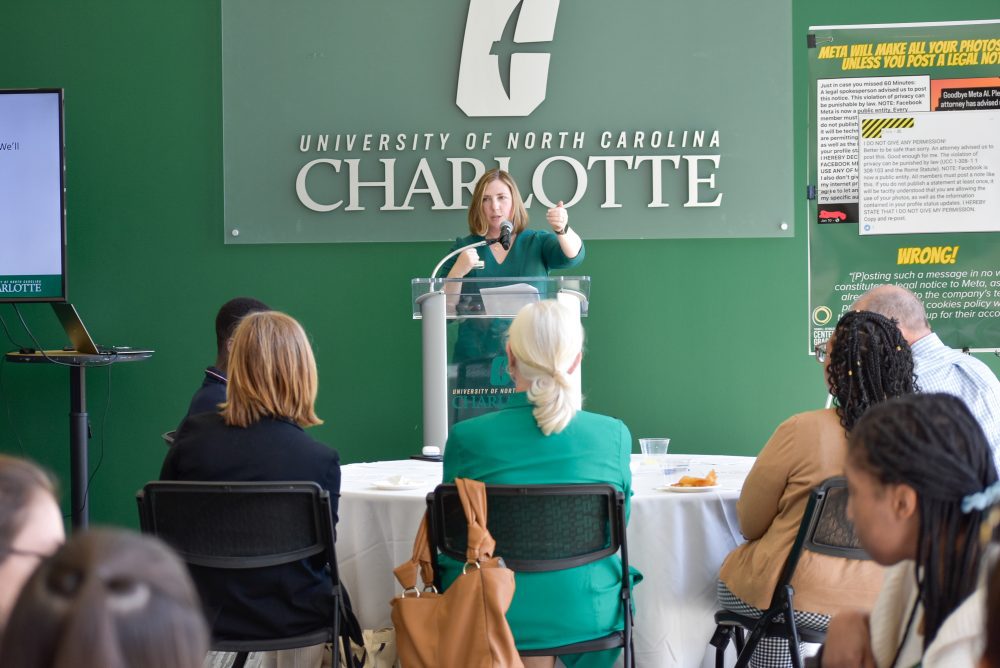Research Projects on Student Learning and Success
Student Learning and Success at UNC Charlotte:
Research Projects
STEM Communication Training Program
This project with the UNC Charlotte Center For Graduate Life and Learning will design, implement and evaluate an online professional development program to train Charlotte graduate students in good practices for communicating STEM topics to broad audiences. The 3-year project is funded by the National Science Foundation (NSF 20-595 Innovations in Graduate Education (IGE) Program) and is led by co-PIs Dr. Elise Demeter from Assessment & Accreditation, Dr. Jill Huerta, Dr. Aura Young, and Dr. Adam Reitzel.


Fostering a Culture of Openness and Transparency with Institutional Authorship Policies
This project with the UNC Charlotte Graduate School will implement and evaluate strategies for ensuring open, transparent authorship discussions in research teams. It will also focus on institutional efforts to improve our culture for research ethics on campus. This 5-year project is funded by the National Science Foundation (NSF 19-609 Ethical and Responsible Research). The research team includes Dr. Elise Demeter from Assessment & Accreditation, Dr. Lisa Rasmussen, Dr. George Banks, Dr. Katherine Hall-Hertel, and Dr. Tom Reynolds.
Learn more about this work here:
https://graduateschool.charlotte.edu/responsible-research/authorship
Authorship Policy and Resolution Procedures
Funds to FinishTM Index & Intervention
This project created innovative, enterprise-scale technology tools to help universities identify early to mid career undergraduates at-risk of not graduating in a timely manner due to academic or financial reasons. The University of North carolina at Charlotte filed an intent-to-use trademark for the Funds to FinishTM .
Learn More: Funds to Finish Program Q&A
Associated media article: https://www.northcarolina.edu/news/guardrails-on-the-learning-curve/
Culturally Relevant Assessment
This project investigates the extent to which assessment choices by faculty are responsible for achievement gaps in undergraduate classes. There has been ample consideration of the efficacy of different instructional techniques. The current project extends this work by examining the effects of assessment choices on achievement gaps in higher education. Due to problems with alignment and the risk of evoking stereotype threat, we predict a high risk of achievement gaps in many forms of testing. When assignments have good alignment and are offered in a supportive environment, we predict that reflective writing and ePortfolio practice will have a low risk of producing achievement gaps because students apply content to their lived experiences and view assignments as having high utility value. We predict minimal risk for achievement gaps in inclusive projects, which are high in inclusive content but often lack utility value. Similarly, we predict a minimal risk for achievement gaps in writing in the discipline and applied learning projects, which are high in utility value but often lack inclusive content. Finally, we predict a high risk of achievement gaps in formal essays, which are generally low in utility value and inclusive content.To explore the predictive model, Singer-Freeman Hobbs, and Robinson (in press) examined scores from the same students on different assignments disaggregated by ethnic minority status in four classes (Introduction to Theater, Child Development, Language Development, and Experimental Psychology) at a community college and a liberal arts college. There was no evidence of achievement gaps in inclusive projects, reflective writing in any mode of delivery (online, traditional, or ePortfolio), or writing in the discipline. However, ethnic minority students received lower grades than non-ethnic minority students on formal essays, multiple-choice exams, multiple-choice quizzes, and open-ended exam questions. Our data provide preliminary support for the model of culturally relevant assessment. Achievement gaps emerged in assessments that were low in both utility value and inclusive content. We hypothesize the achievement gaps revealed in test scores were false because other assignments that were designed to assess the same areas of mastery but were high in either utility value (reflective writing and writing in the discipline) or inclusive content (inclusive projects) evoked equivalent evidence of competence from the same groups of students regardless of ethnicity.
Singer-Freeman, K. E., Hobbs, H., & Robinson, C. (2019) Theoretical matrix of culturally relevant assessment. Assessment Update, 31(4). link
Preventing Student Stop Out
The ‘Preventing Stop-Out at UNC Charlotte’ study by the UNC Charlotte Office of Assessment and Accreditation and Enrollment Management received funding from a Fall 2016 UNC System Office request for proposals. This exploratory, mixed-methods investigation examined the academic, demographic, and financial aid records of academically-eligible undergraduates who stopped-out (failed to register for one or more semesters) between Fall 2014 and Spring 2017. The study quantified our institution’s stop-out population (~680 students per semester), and identified at-risk student groups including female and black students, students within our College of Liberal Arts and Sciences, and students admitted as transfers. Transfer students – a group highlighted in the UNC System’s Strategic Plan Access Goal #2 – represent ~44% of our undergraduate population, but accounted for 65% of our stop-out population. Using logistic regression techniques and a comparison population of late-registering students, we found additional factors predicting stop-out, including registration holds due to financial balances, past history of stop-out, and lower cumulative GPAs. Stop-out students did not have greater loan indebtedness than students who did ultimately register for courses (aligns with Strategic Plan Access Goal #1, low-income students). However, our qualitative survey of current stop-out students revealed 71% indicated financial concerns were a motivator for stopping-out. Critically, the majority of respondents cited a combination of academic, financial, social, or personal reasons for stopping out. This made it clear stop-out is a multifaceted issue necessitating efforts from units across the institution. To this end, the study team strategically decided to present these data to a wide audience of stakeholders across campus. The ‘Preventing Stop-Out at UNC Charlotte’ findings were presented to the Provost’s Student Success Working Group (40 senior staff & administrators from across campus), staff in Enrollment Management and the Office of Financial Aid, the Student Affairs Directors, the Dean of Students Office staff, and to 125 faculty, staff, and administrator attendees of the Provost & Vice Chancellor for Student Affairs’ 2018 Academic and Student Affairs Summit on Student Success. The study has informed student success work in UNC Charlotte’s Transfer Center, work in the 49er Finish Program, and the work of a Business Affairs-led taskforce proposing policy changes to increase the financial unpaid balance amount triggering registration holds, a change that evidence suggests will increase students’ degree efficiency (Strategic Plan Student Success Goal #4). The findings motivated a second study by the Office of Assessment and Accreditation, Enrollment Management, and Business Affairs on the causes and consequences of student financial distress. Finally, the study findings are also motivating targeted financial aid interventions by expanding UNC Charlotte’s Gold Rush mini-grant program to include cohorts based on the identified at-risk student populations. Collectively, the shared data on students who stop-out has helped inform and motivate institutional efforts to proactively prevent stop-out and to improve our students’ success.
Demeter, E. (2018). Communicating for Success: Using Stop Out Data to Motivate Institutional Change. Presented at the Student Success Conference hosted by UNC System Office, Chapel Hill, NC.
Associated media article: https://www.northcarolina.edu/content/Exchanging-Ideas